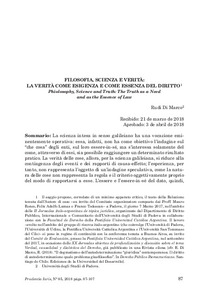Please use this identifier to cite or link to this item:
https://repositorio.uca.edu.ar/handle/123456789/2560| Título: | Filosofia, scienza e verità : la verità come esigenza e come essenza del diritto Philosophy, science and truth : the truth as a need and as the essence of law |
Autor: | Di Marco, Rudi | Palabras clave: | FILOSOFIA; CIENCIA; VERDAD; DERECHO; JURISPRUDENCIA | Fecha de publicación: | 2018 | Editorial: | Universidad Católica Argentina. Facultad de Derecho | Cita: | Di Marco, R. (2018). Filosofia, scienza e verità : la verità come esigenza e come essenza del diritto [en línea]. Prudentia Iuris, 85. Disponible en: https://repositorio.uca.edu.ar/handle/123456789/2560 | Resumen: | Sommario: La scienza intesa in senso galileiano ha una vocazione eminentemente operativa: essa, infatti, non ha come obiettivo l’indagine sul “che cosa” degli enti, sul loro essere-in-sé, ma s’interessa solamente del come, attraverso di essi, sia possibile raggiungere un determinato risultato pratico. La verità delle cose, allora, per la scienza galileiana, si riduce alla contingenza degli eventi e dei rapporti di causa-effetto; l’esperienza, per tanto, non rappresenta l’oggetto di un’indagine speculativa, come la natura delle cose non rappresenta la regola e il criterio oggettivamente proprio del modo di rapportarsi a esse. L’essere e l’essere-in-sé del dato, quindi, per l’approccio scientifico-galileiano, altro non sono che il contesto sul quale operare in qualunque modo e attraverso il quale perseguire qualsiasi finalità. Un siffatto approccio applicato al diritto, allora, porta a negare ogni valore e ogni dignità epistemologica all’essere in sé dello ius e al suo fondamento nel principio della giustizia: lo studio del diritto, infatti, inteso come scienza galileiana, si riduce all’analisi delle prescrizioni positive e all’elaborazione delle tecniche legislative più idonee a raggiungere qualunque scopo venga ritenuto, dal detentore storico del potere, meritevole di essere perseguito. Abstract: Science, in the Galilean sense, is s an operative knowledge: in fact, its investigation’s objective is not the “what” of the entities are, but is only the “how” it is possible to reach a certain practical result. The truth of things, then, for Galilean science, is reduced to the contingency of events and of cause-effect relationships; the experience, therefore, does not represent the object of a speculative investigation, and the nature of things does not represent the rule and the criterion of relating to them. This approach applied to law, then, denies any value and epistemological dignity to the ius and to the law foundation in the principle of justice: the study of law, in fact, in the Galilean science, is reduced to analysis of the positive prescriptions and the development of the legislative techniques. |
URI: | https://repositorio.uca.edu.ar/handle/123456789/2560 | ISSN: | 0326-2774 (edición impresa) 2524-9525 (edición online) |
Disciplina: | DERECHO | Derechos: | Acceso Abierto | Fuente: | Prudentia Iuris, 85, 2018 |
| Appears in Collections: | PI - 2018 nro. 85 |
Files in This Item:
| File | Description | Size | Format | |
|---|---|---|---|---|
| 1180-4092-1-PB.pdf | 158,29 kB | Adobe PDF |  View/Open |
Page view(s)
94
checked on Apr 30, 2024
Download(s)
97
checked on Apr 30, 2024
Google ScholarTM
Check
This item is licensed under a Creative Commons License

